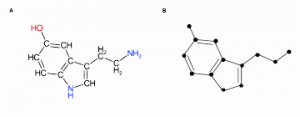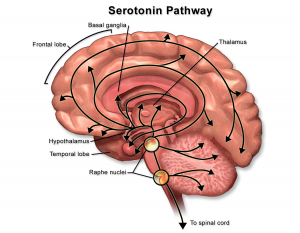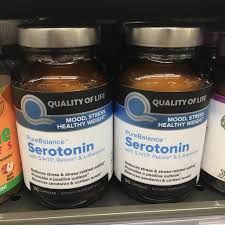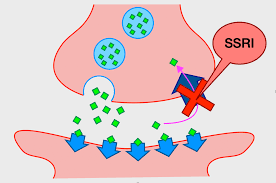The Psychological And Physiological Effects Of Serotonin
Video Link: https://vimeo.com/182525120
Video Download: The Psychological And Physiological Effects Of Serotonin
Video Stream: The Psychological And Physiological Effects Of Serotonin
Serotonin Hormone Guide
What is Serotonin?
Serotonin is an important hormone that regulates a wide variety of functions in the body and is most notable for its effects on mood and well-being. Serotonin is found in a number of areas of the body, including the brain, central nervous system, platelets, and digestive system.
The body synthesizes serotonin from a hormone known as tryptophan, which most people recognize as the hormone in turkey and many other foods that make us sleepy. Maintaining Serotonin balance is a vitally important aspect of promoting both the brain's and body's health.
Effects of Serotonin, both Psychological and Physiological
Contrary to popular belief, the vast majority of serotonin produced by the body is secreted into the digestive system to promote motility in the intestinal tract. Around ninety percent of the serotonin released by the body serves this purpose.
When the digestive system releases Serotonin, it acts upon the intestines and drains out into the bloodstream over time. Platelets can actually absorb  this Serotonin and use it for their own purposes.
this Serotonin and use it for their own purposes.
Platelets are cells in the bloodstream that don't have nuclei and are primarily used as a clotting mechanism. When the platelets begin forming a blood clot, they emit their stored serotonin, shrink blood vessels in the surrounding area to control blood flow, and help stop circulatory leakage.
Serotonin also promotes cellular metabolism in certain types of tissue, and it is hypothesized that the hormone helps speed up healing in the case of injury.
Neurological Effects of Serotonin
Aside from the digestive system, the second most active area for Serotonin production is the central nervous system, where the hormone impacts physiological activity in various ways.
Serotonin impacts a number of regulatory systems in the brain, including sleep, appetite, and mood.
Serotonin also influences learning, memory, and other cognitive abilities. There are a number of antidepressant medications that function by altering the way that the body responds to Serotonin, including Selective Serotonin Reuptake Inhibitors (SSRIs).
Serotonin in Nature
Serotonin is not only found in humans and animals but also in plants and fungi. Serotonin can promote a pain response under some circumstances, and the hormone often coats the barbs of plants and is often a component of venom in insects.
In fact, when Serotonin is administered via injection, it can sometimes cause pain to the patient, as if they were bitten or stung.
Serotonin and Digestive Health
There are also instances where organisms produce Serotonin within the digestive system. For example, the amoeba can replicate in the stomach and intestines, releasing serotonin, speeding up the digestive tract, and leading to diarrhea. Also, Serotonin is present in many fruits and seeds, which causes the digestive system to pass seeds more effectively.
Serotonin Produced by All Complex Animals
Serotonin is an essential neural hormone and is produced by all animals with bilateral symmetry. Dependent upon the organism's complexity, Serotonin serves an increasingly more significant role in the nervous system. In simple animals like invertebrates, Serotonin primarily helps the organism recognize the abundance of food in a particular area.
In more evolved animals, like vertebrates and arthropods, Serotonin evaluates food resources and plays a role in social interactions, including dominance and submission.
Because reproduction and the viability of young depend on food availability, Serotonin contributes to the production of sex hormones and the motivation to breed. Serotonin also has a powerful impact on growth and mood.
Serotonin, Depression, and Obsessive Compulsive Disorder
Serotonin plays a complex role in maintaining healthy emotional balance in human beings. People that don't produce enough Serotonin are both more likely to suffer from depression and more likely to suffer from compulsive thoughts.
Related to the mechanisms of Serotonin, people that don't produce enough Serotonin are more likely to engage in risky activities, including promiscuous sex and self-harm.
There is some clinical evidence that Depression inhibits the brain's ability to produce new neurons, which suppresses activity in certain parts of the brain,  particularly those related to mood stability and well-being.
particularly those related to mood stability and well-being.
It is believed that SSRIs can restore Serotonin Levels in the brain, encouraging the rejuvenation of brain cells, which helps the mind recover from depression and generally improve quality of life from a psychological perspective.
It is unclear, however, whether Serotonin Deficiency leads to depression or if it is perhaps the other way around. Of course, depending on the patient's particulars, either or both of these issues could be at play.
In patients who experience chronic depression and OCD from an early age, the cause would primarily be neurological. In patients who experience depression later in life, the cause is much more likely to result from circumstances in their lives.
How Do SSRIs Treat Psychological Disorders such as Depression and OCD?
One of the most common treatments for OCD and Depression is the prescription of a Selective Serotonin Reuptake Inhibitor. These medications increase the activity of Serotonin in the brain by slowing down the rate at which neurons reabsorb Serotonin after releasing the hormone.
The way that our body uses Serotonin is relatively simple. A neuron receives a signal to release Serotonin, and it does so, releasing it a very short distance to the next neuron, where it remains active in the space between the neurons, exerting its function.
In many patients with OCD and Depression, Serotonin is released. Still, it may not be released in sufficient quantities, or it may not stay active for the appropriate amount of time before it is absorbed. SSRIs can treat both of these issues by increasing Serotonin activity in the brain.
Functions of Serotonin in Humans
Serotonin and Appetite
Many animals use Serotonin as a mechanism to convince animals to stay in the presence of food, but in humans, Serotonin is used as an appetite inhibitor. When you smell food, this causes your brain to release Dopamine, which is why you suddenly get more hungry when you smell an appetizing meal.
Serotonin, on the other hand, is released when you actually eat the food, suppressing the brain's release of dopamine.
Receptors on cells in the brain produce Dopamine, known as 5-HT2C. These points absorb Serotonin and subsequently cause the cells to cease the production of Dopamine. In fact, drugs and neurological disorders cause these receptors to deactivate, which prevents the brain from recognizing when it's complete, leading to overeating. Many people that feel uncontrollable urges to eat are born without a full array of these receptors.
Serotonin and Diet
As we mentioned earlier, Serotonin is synthesized by the human body from tryptophan. Interestingly enough, simply eating food with tryptophan as an ingredient, such as turkey, does not have a subsequent effect on Serotonin Levels. On the other hand, eating pure tryptophan does lead to an increase in Serotonin Levels.
There is a reason for this. tryptophan can cross the barrier from the bloodstream to the brain, but only under certain circumstances. Tryptophan only crosses the barrier when it is isolated from other proteins that are present in food.
This encourages the body to allow tryptophan produced by its peripheral organs to pass easily into the system, although this can be bypassed by taking  pure tryptophan.
pure tryptophan.
Some studies present evidence that a high-carb, low-protein diet can result in an elevation in Serotonin levels, and it does so by promoting the release of Insulin.
The issue with this, however, is that if this process is sustained for a long time, it may lead to conditions such as Type-2 Diabetes, obesity, and increasing resistance to insulin, which ultimately suppresses serotonin production.
People with more muscle actually have more Serotonin than their leaner counterparts. This is because the muscles use all amino acids except tryptophan, which increases Serotonin production because the brain absorbs more Tryptophan when there are lower concentrations of other amino acids.
Serotonin and the Digestive System
When we eat, food passes through the digestive system. As food passes into the intestines, it encourages the release of Serotonin by what are known as enterochromaffin cells. This encourages motility because it stimulates the contraction of the intestines. Some veins connect to the intestines, and platelets pass this area, absorbing unused Serotonin.
Serotonin is also one of the mechanisms which cause diarrhea. Suppose the body recognizes an irritant or potential danger in the digestive system. In that case, the production of Serotonin in the digestive system increases dramatically to pass the offending substance(s) out of the body more quickly.
If the digestive system creates more Serotonin than the platelets can transport, this increases the concentrations of free Serotonin in the bloodstream. Free Serotonin then circulates through the body and encourages nausea and vomiting.
There are drugs designed to block this response, and they are generally used to suppress vomiting and nausea, which are often symptoms of chemotherapy and radiation.
Serotonin and Social Interaction
In many animal species, one's access to food is dependent upon competition. If an animal does not display enough aggression, it may not get as much food to eat. Based upon this inter-relationship between social hierarchy and food availability, Serotonin became involved in social interaction from an evolutionary perspective.
In many animals, Serotonin encourages the animal to engage with its social peers as an alpha. On the other hand, Serotonin impacts the fight-or-flight response dependent upon the social rank of the animal.
In aeta-subordinate animals, Serotonin suppresses the urge to flee, whereas, in alpha animals, Serotonin encourages flight, based upon a different distribution of Serotonin receptors.
When the brain uses Serotonin, it is usually absorbed by neurons designed to transport Serotonin.
Research has shown that much of the pathology related to anxiety in humans is related to how Serotonin is distributed after these transporters have absorbed it.
Serotonin and Aging
There are many ways that Serotonin impacts the aging process, as well as the cognitive capabilities of the brain. In many more primitive animal species, as Serotonin levels rise, it improves certain forms of memory.
Serotonin levels fall as the creature ages, which inhibits these processes. Still, it is possible to bolster cognitive memory capability despite aging by blocking the re-uptake of Serotonin.
In human beings and mammals, Serotonin levels do not rise with age in the same way, but they start to fall as people reach the late stages of their life span, which impacts cognitive capacity.
Serotonin and Bone Mineral Density
Research has shown that in human beings, Serotonin concentrations in the bloodstream play a role in controlling and regulating bone mineral density. In rodent subjects, individuals who can produce Serotonin turned off in the brain but not in the digestive system experience Osteopenia.
On the other hand, those that have high levels in the brain but do not have high levels in the digestive system have elevated bone mineral density.
Human research has not been as in-depth. Still, there is strong evidence that individuals with elevated Serotonin levels in the blood are more likely to experience Osteopenia and Osteoporosis later in life. In the future, regulating Serotonin may be a way to treat patients with health conditions related to bone metabolism.
Serotonin and Human Development
In many animals, Serotonin plays a central role in encouraging average growth and development into adulthood. Proper Serotonin levels during childhood and adolescence ensure that the body focuses the prime amount of resources on the developing child.
Suppose there is not enough food available, or other similar situations can impact health and viability during development. In that case, Serotonin levels drop, which causes the child to develop more slowly.
Serotonin also promotes the production of HGH and its related growth factors, especially IGF-1. This is one of the mechanisms that helps encourage growth during puberty and also increases healing capacity in the case of injury.
Serotonin and the Cardiovascular System
As we mentioned earlier, Serotonin is released by the digestive system and eventually absorbed by the platelets in the cardiovascular system. When there is damage in the arteries or veins, Serotonin encourages the healing process as it is released from the platelets after they have formed a blood clot. This released Serotonin also emits signals to the immediate area to restrict blood flow, which helps to stem bleeding.
How Does the Human Body Make Serotonin?
There are two mechanisms by which human beings and other mammalian species produce Serotonin, both of which rely on the conversion of Tryptophan into Serotonin.
One form of Tryptophan known as TPH1 is converted into Serotonin by the digestive system (the enterochromaffin cells) and the pineal gland, while a second form, TPH2, is converted into Serotonin by circulatory structures attached to the digestive system (the myenteric plexus) and neurons in the brain stem (the raphe nuclei)
In lab mice, TPH1 is shown to be vitally crucial to heart health. Without the ability to produce TPH1, the subjects have significant heart strength and circulation issues and have significantly increased mortality.
On the other hand, mice without the ability to produce TPH2 are fine while they are in utero, but they don't grow at the same rate as their peers after birth, causing them to be much more likely to die before they have been weaned from the mother.
If they survive the past five weeks, they end up as healthy as their typical peers but have significant aggression-related social issues.
How Does Serotonin Deficiency Impact Infant Health?
In the case of human beings, there is some evidence that SIDS may result from a malfunction in the way the infant body processes Serotonin.
In animal research, when mice were programmed to produce less Serotonin than average, it directly led to many issues related to Sudden Infant Death Syndrome, including cardiovascular insufficiency, which increased infant mortality rates. This is because Serotonin produced by the raphe nuclei plays a role in breathing and heartbeat.
Serotonin Depletion and Mood Disorders
Serotonin is linked to a variety of disorders associated with mood. Serotonin Deficiency is strongly linked to both Depression and Obsessive-Compulsive Disorder. Interestingly enough, Serotonin Deficiency is also a temporary condition that occurs when someone falls for another emotionally and is associated with OCD tendencies that occur in the early parts of many relationships.
Disorder. Interestingly enough, Serotonin Deficiency is also a temporary condition that occurs when someone falls for another emotionally and is associated with OCD tendencies that occur in the early parts of many relationships.
Serotonin and Alcohol
Moderate consumption of alcohol leads directly to a state of Serotonin Depletion resulting from a reduction in the concentration of tryptophan in the bloodstream. This is one of the reasons people who drink alcohol are more likely to engage in impulsive activities, including sex because serotonin modulates self-control and libido.
Serotonin and Your Health
As you can see, Serotonin is one of the most physiologically complex hormones produced by the human body and affects change in various ways. Healthy Serotonin balance is vital to sustaining health and wellness, both psychological and physical.
References:
Serotonin Wiki:
http://en.wikipedia.org/wiki/Serotonin
Serotonin WebMD:
http://www.webmd.com/depression/features/serotonin
- What Is Adrenal Fatigue [Last Updated On: August 20th, 2024] [Originally Added On: October 23rd, 2020]
- Understanding Thyroid Function And Diagnosing Thyroid Issues [Last Updated On: August 21st, 2024] [Originally Added On: October 24th, 2020]
- Twelve Steps To Enhance And Preserve Your Memory [Last Updated On: January 28th, 2025] [Originally Added On: October 25th, 2020]
- The Facts About Psoriasis: Symptoms And Causes [Last Updated On: January 27th, 2025] [Originally Added On: October 27th, 2020]
- The Facts About Acromegaly [Last Updated On: August 24th, 2024] [Originally Added On: October 28th, 2020]
- The Effects Of Hgh Deficiency Upon One Of A Pair Of Twins [Last Updated On: January 27th, 2025] [Originally Added On: October 29th, 2020]
- Resveratrol Anti-aging Supplementation For Longevity [Last Updated On: August 19th, 2024] [Originally Added On: October 30th, 2020]
- Sermorelin Acetate Injections With Ghrp-6 [Last Updated On: February 18th, 2025] [Originally Added On: October 31st, 2020]
- Melatonin The Sleep Hormone How It Impacts Your Health [Last Updated On: August 26th, 2024] [Originally Added On: November 1st, 2020]
- Mark Cuban To Fund Study On Healing Power Of Hgh [Last Updated On: August 27th, 2024] [Originally Added On: November 2nd, 2020]
- Mark Cuban Advocates For Hgh As A Rehab And Recovery Tool [Last Updated On: January 26th, 2025] [Originally Added On: November 3rd, 2020]
- Leptin Hormone Guide: The Effects Of The Satiety Hormone [Last Updated On: January 26th, 2025] [Originally Added On: November 4th, 2020]
- Human Growth Hormone Deficiency Impact On Sleeping Habits [Last Updated On: January 25th, 2025] [Originally Added On: November 5th, 2020]
- Human Growth Hormone And Liver Regeneration [Last Updated On: January 25th, 2025] [Originally Added On: November 6th, 2020]
- Hgh Treatment For Fatty Liver Disease On The Horizon [Last Updated On: February 17th, 2025] [Originally Added On: November 7th, 2020]
- Your Current HGH Level [Last Updated On: March 28th, 2025] [Originally Added On: November 8th, 2020]
- Ghrelin The Hunger Hormone [Last Updated On: January 24th, 2025] [Originally Added On: November 9th, 2020]
- Enclomiphene Citrate Andropause Treatment Up For Fda Approval [Last Updated On: January 24th, 2025] [Originally Added On: November 10th, 2020]
- Dopamine Pleasure Hormone And So Much More [Last Updated On: July 27th, 2024] [Originally Added On: November 11th, 2020]
- Diabetes Cure On The Horizon [Last Updated On: January 23rd, 2025] [Originally Added On: November 12th, 2020]
- Boost Metabolism To Lose Weight And Maintain Weight Loss [Last Updated On: January 23rd, 2025] [Originally Added On: November 13th, 2020]
- Andropause A Mid-life Hormone Crisis [Last Updated On: February 18th, 2025] [Originally Added On: November 14th, 2020]
- SOGROYA INJECTIONS FOR HUMAN GROWTH HORMONE DEFICIENCY [Last Updated On: February 19th, 2025] [Originally Added On: March 24th, 2021]
- How Do High and Low Estrogen Impact Male Health and Wellness? [Last Updated On: February 9th, 2025] [Originally Added On: April 2nd, 2021]
- The Effects Of Hormone Imbalance On Belly Fat [Last Updated On: February 18th, 2025] [Originally Added On: May 8th, 2021]
- Could Sunlight Help Remove Rogue Hormones from the Water Supply? [Last Updated On: February 20th, 2025] [Originally Added On: May 29th, 2021]
- Weekly HGH Therapy Just as Effective as Daily Injections [Last Updated On: July 5th, 2024] [Originally Added On: June 18th, 2021]
- DHEA and Testosterone: A winning team! [Last Updated On: February 14th, 2025] [Originally Added On: January 19th, 2022]
- Animal Research Discovers Link Between Exercise, HGH, and Cognitive Ability [Last Updated On: February 14th, 2025] [Originally Added On: May 20th, 2022]
- Weekly Hormone Treatments for Adult HGH Deficiency with Sogroya [Last Updated On: February 18th, 2025] [Originally Added On: June 14th, 2022]
- Ancient Critters Made Human Hormone System What It Is Today [Last Updated On: March 13th, 2025] [Originally Added On: June 26th, 2022]
- How Substance Abuse Can Affect Your Hormone Levels [Last Updated On: March 16th, 2025] [Originally Added On: August 4th, 2022]
- A Holistic Approach to Health and Water Safety [Last Updated On: February 7th, 2025] [Originally Added On: February 7th, 2025]
- Understanding the Role of Sogroya in Adult Human Growth Hormone (HGH) Deficiency Treatment [Last Updated On: February 12th, 2025] [Originally Added On: February 11th, 2025]
- Andropause: An Examination of Mid-life Hormonal Shifts in Males [Last Updated On: February 16th, 2025] [Originally Added On: February 13th, 2025]
- Sermorelin Acetate Therapy: A Comprehensive Insight into its Benefits with GHRP-6 [Last Updated On: February 17th, 2025] [Originally Added On: February 14th, 2025]
- The Dynamic Duo of Male Vitality: Testosterone and DHEA [Last Updated On: February 14th, 2025] [Originally Added On: February 14th, 2025]
Word Count: 2466







